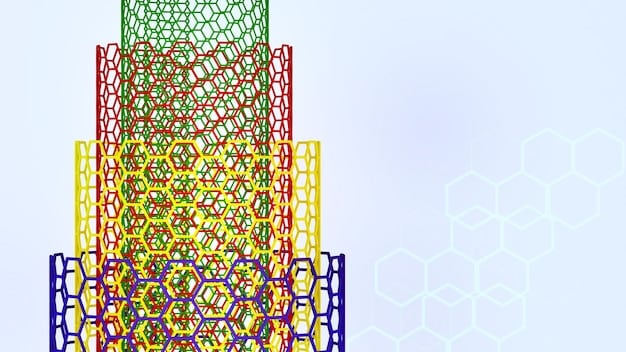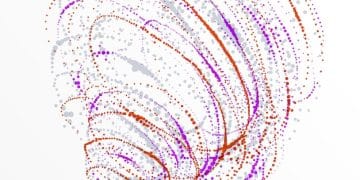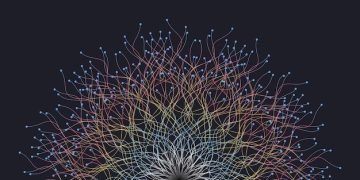Quantum Computing’s Impact on US AI Research: A Deep Dive

US AI research is increasingly exploring the potential of quantum computing to significantly accelerate machine learning algorithms, offering unprecedented computational power for complex data analysis and model training.
The landscape of US AI research: exploring the potential of quantum computing for accelerating machine learning algorithms is rapidly evolving, driven by the promise of quantum computing. This powerful combination is poised to revolutionize how we approach complex problems, offering unprecedented computational speeds and capabilities.
Quantum Computing Fundamentals for AI Researchers
Understanding the fundamentals of quantum computing is crucial for AI researchers looking to leverage its potential. Quantum computing leverages the principles of quantum mechanics to perform computations in ways that classical computers cannot.
Qubits vs. Bits: A Quantum Leap
Unlike classical bits, which can represent either 0 or 1, qubits can exist in a superposition of states. This means they can represent 0, 1, or both simultaneously, greatly expanding computational possibilities.
Entanglement and Superposition: Quantum Magic
Entanglement, another key quantum phenomenon, allows qubits to be linked together in such a way that the state of one qubit instantly influences the state of another, regardless of the distance between them. Superposition and entanglement together enable quantum computers to perform multiple calculations simultaneously, leading to exponential speedups for certain types of problems.
- Superposition: Allows qubits to exist in multiple states at once.
- Entanglement: Links qubits together, enabling correlated computations.
- Quantum Gates: Manipulate qubits to perform computations.
These unique properties make quantum computers particularly well-suited for tasks that are computationally intensive for classical computers, such as optimizing complex models and searching large datasets.
Quantum algorithms, like Shor’s algorithm for factoring large numbers and Grover’s algorithm for searching unsorted databases, demonstrate the potential for exponential speedups in specific applications relevant to AI.

Quantum Decoherence: A Challenge to Overcome
One of the main challenges in quantum computing is maintaining the delicate quantum states of qubits. Quantum decoherence, the loss of quantum information due to environmental interactions, can disrupt computations and introduce errors. Overcoming decoherence is a critical area of research in the field. Scientists are exploring various methods to improve the stability and coherence of qubits, including using error correction codes and developing more isolated and controlled quantum systems.
In conclusion, grasping these fundamental concepts is essential for AI researchers venturing into the realm of quantum computing. While challenges remain, the potential benefits are substantial, paving the way for groundbreaking advances in machine learning and artificial intelligence.
Accelerating Machine Learning with Quantum Algorithms
Quantum algorithms offer exciting possibilities for accelerating various machine learning tasks. These algorithms leverage the unique properties of quantum mechanics to provide speedups over classical algorithms for specific problems.
Quantum Optimization Algorithms
Optimization problems are ubiquitous in machine learning, from training neural networks to feature selection. Quantum optimization algorithms, such as the Quantum Approximate Optimization Algorithm (QAOA), offer the potential to find optimal solutions more quickly than classical methods. QAOA is particularly useful for solving combinatorial optimization problems, which are often encountered in machine learning.
Quantum Machine Learning Libraries
Several quantum machine learning libraries, such as PennyLane and Qiskit, are emerging to assist AI researchers in implementing quantum algorithms. These libraries provide tools and frameworks for designing, simulating, and executing quantum machine learning models. They abstract away some of the complexities of quantum computing, making it more accessible to researchers with expertise in machine learning but limited background in quantum mechanics.
- PennyLane: A cross-platform Python library for quantum machine learning.
- Qiskit: An open-source quantum computing software development kit.
- TensorFlow Quantum: An extension of TensorFlow for hybrid quantum-classical computation.
These new algorithms are helping to solve existing machine learning tasks, and help to perform classical machine learning tasks much faster, and increase their accuracy. Although there are still hardware constraints holding these algorithms back, the future looks bright for US AI research in the utilization of quantum algorithms for machine learning.
Quantum Support Vector Machines (QSVMs)
Quantum Support Vector Machines (QSVMs) represent one area where quantum algorithms could dramatically accelerate pattern recognition. By encoding data into quantum states, QSVMs can perform complex calculations more efficiently than classical SVMs. However, QSVMs are still in the early stages of development, and their practical advantages are not yet fully realized due to limitations in quantum hardware.

In conclusion, quantum algorithms hold significant promise for accelerating machine learning tasks. While challenges remain, ongoing research and development in this area are paving the way for transformative advancements in AI.
The Role of Quantum Hardware in AI Innovation
Advancements in quantum hardware are pivotal for realizing the full potential of quantum-enhanced AI. The development of stable, scalable, and reliable quantum computers is essential for running complex quantum machine learning algorithms.
Superconducting Qubits: Leading the Way
Superconducting qubits are currently one of the leading technologies in quantum computing hardware. Companies like IBM and Google are investing heavily in superconducting qubit-based quantum processors. These qubits are manufactured using conventional microfabrication techniques, making them relatively easier to scale.
Trapped Ions: Another Promising Approach
Trapped ion qubits offer high fidelity and long coherence times, making them another promising approach to quantum hardware. Companies like IonQ are focused on developing trapped ion quantum computers. Trapped ions use individual charged atoms as qubits and control their quantum states using lasers.
Topological Qubits: The Future of Robustness
Topological qubits, while still in the early stages of development, represent a potentially revolutionary approach to quantum computing. These qubits are inherently robust to noise and decoherence, making them more stable and reliable than other types of qubits. Microsoft is actively pursuing topological qubits as a key element of its quantum computing strategy.
One of the biggest issues with quantum hardware in the current era, is the lack of scalability. The quantum computer systems lack the overall power to perform as required to solve several machine learning and artificial intelligence projects. As quantum hardware evolves over the next coming years, these scaling constraints will eventually be overcome.
- IBM Quantum: Offers cloud access to superconducting quantum computers.
- Google Quantum AI: Developing superconducting quantum processors for AI applications.
- IonQ: Building trapped ion quantum computers with high fidelity.
Therefore, ongoing progress in quantum hardware is crucial for unlocking the full transformative potential in US AI research that are enhanced by quantum resources. Quantum hardware is crucial to the future of AI, and the advancement in technology will open doors for innovations.
In conclusion, innovations in quantum hardware are essential for driving advancements in quantum-enhanced AI. The ongoing development of stable, scalable, and reliable quantum computers will pave the way for groundbreaking discoveries in artificial intelligence.
Challenges and Opportunities in Quantum Machine Learning
While quantum machine learning holds tremendous promise, it also faces several challenges and opportunities. Addressing these issues is crucial for realizing the full potential of this exciting field.
Data Encoding: A Quantum Bottleneck
Encoding classical data into quantum states can be a significant bottleneck in quantum machine learning. Efficient data encoding techniques are needed to fully leverage the speedups offered by quantum algorithms. Researchers are exploring various methods for data encoding, including amplitude encoding, angle encoding, and basis encoding.
Quantum Error Correction: Ensuring Accuracy
Quantum error correction is essential for mitigating the effects of noise and decoherence in quantum computations. Developing robust quantum error correction codes is a critical area of research. Quantum error correction involves encoding quantum information in a redundant manner such that errors can be detected and corrected without disturbing the underlying quantum state.
Hybrid Quantum-Classical Algorithms: A Pragmatic Approach
Hybrid quantum-classical algorithms, which combine the strengths of both quantum and classical computers, offer a pragmatic approach to quantum machine learning in the near term. These algorithms use quantum computers to perform specific computationally intensive tasks, while classical computers handle the remaining parts of the computation. Variational Quantum Eigensolver (VQE) and Quantum Approximate Optimization Algorithm (QAOA) are examples of hybrid algorithms being widely used in AI research.
Researchers have found in multiple scenarios that integrating both hybrid quantum algorithms, as well as hybrid data encoding, can dramatically help quantum machine learning tasks, as well as help solve conventional AI and ML tasks in classical computing.
- Data Preprocessing: Efficiently converting classical data into quantum states.
- Error Mitigation: Reducing the impact of noise on quantum computations.
- Algorithm Design: Developing new quantum machine learning algorithms tailored to specific applications.
In conclusion, addressing these challenges and seizing the opportunities will be critical for realizing the transformative potential of quantum machine learning. By overcoming the limitations and leveraging the strengths of both quantum and classical computing, the field can achieve unprecedented advancements in AI.
Ethical and Societal Implications of Quantum AI
As quantum AI becomes more powerful, it is important to consider the ethical and societal implications. The transformative potential of this technology raises important questions about fairness, accountability, and security.
Bias Amplification: A Concern to Address
Quantum machine learning models have the potential to amplify biases present in training data. Careful attention must be paid to data collection and preprocessing to ensure fairness and prevent discriminatory outcomes. Researchers are exploring techniques for bias detection and mitigation in quantum machine learning models.
Security Risks: A New Frontier
Quantum computers could potentially break many of the cryptographic algorithms that are currently used to secure online communications and data storage. Developing quantum-resistant cryptography is essential for protecting sensitive information in the quantum era. The National Institute of Standards and Technology (NIST) is actively working on standards for quantum-resistant cryptographic algorithms.
Job Displacement: A Socioeconomic Challenge
The automation capabilities of quantum AI could lead to job displacement in certain sectors. Policymakers and educators need to prepare for these changes by investing in retraining and education programs. Quantum AI has the ability to change the US and global workforce, and the government needs to react accordingly.
Due to these potential ethical and societal risks from quantum AI, it is imperative that researchers, policymakers, and industries work together to ensure that these risks are mitigated, and that the potential benefits of quantum AI are available to everyone.
- Fairness: Ensuring quantum AI systems do not perpetuate or amplify biases.
- Security: Developing quantum-resistant cryptographic algorithms.
- Socioeconomic Impact: Addressing potential job displacement and inequality.
In conclusion, addressing the ethical and societal implications of quantum AI is crucial for ensuring that this technology is used responsibly and for the benefit of all. By proactively addressing these challenges, quantum AI can empower positive change and create a more equitable and secure future.
Future Trends in US AI Research: Quantum Computing Integration
The integration of quantum computing into artificial intelligence research is set to shape the future of AI. Several emerging trends are poised to drive innovation and transform various industries.
Quantum Neural Networks: A New Paradigm
Quantum neural networks, which leverage quantum mechanics to perform computations within neural networks, are an emerging area of research. These networks have the potential to offer speedups and enhanced capabilities compared to classical neural networks. Researchers are exploring various architectures for quantum neural networks, including quantum perceptrons and quantum convolutional neural networks.
Quantum Reinforcement Learning: Enhancing Decision-Making
Quantum reinforcement learning algorithms can potentially accelerate the training of reinforcement learning agents, enabling them to make better decisions in complex environments. Quantum reinforcement learning algorithms could be applied to a wide range of applications, including robotics, game playing, and financial trading.
Cloud-Based Quantum Computing Platforms: Democratizing Access
Cloud-based quantum computing platforms are making quantum resources more accessible to researchers and developers. These platforms provide access to quantum computers over the internet, allowing users to run quantum algorithms without the need for expensive hardware. IBM Quantum Experience, Amazon Braket, and Microsoft Azure Quantum are examples of cloud-based quantum computing platforms that help democratize the access to quantum hardware.
Furthermore, integrating quantum computing into artificial intelligence research is going to require a new type of researcher: one who is well-versed in both aspects of quantum computing and AI. Training such a multifaceted researcher is crucial for the success of this integration, and the government is currently trying to take action to address the shortage of these professionals.
- Quantum Cloud Computing: Wider adoption of quantum resources through the cloud.
- Quantum Specialization: AI researchers specializing in quantum machine learning.
- Quantum Hardware: Advancements in quantum systems and the hardware components.
In conclusion, the future of US AI research is intertwined with quantum computing. This convergence is set to unlock new possibilities and transform various industries.
Ongoing research and new quantum resources will allow AI to accelerate existing models, as well as push for new discoveries in research.
| Key Point | Brief Description |
|---|---|
| 💡 Quantum Computing | Utilizes quantum mechanics for advanced computations. |
| 🚀 Quantum Algorithms | Speeds up machine learning tasks with unique methods. |
| 🌐 Cloud Platforms | Democratizes access with cloud-based quantum resources. |
| 🔒 Ethical Implications | Fairness, security, and socioeconomic impact are key concerns. |
Frequently Asked Questions
▼
Qubits are the basic unit of information in a quantum computer. Unlike classical bits, which can only be 0 or 1, qubits can exist in a superposition, meaning they can represent 0, 1, or both at the same time.
▼
Quantum algorithms, such as QAOA and QSVM, leverage the unique properties of quantum mechanics to perform calculations more efficiently than classical algorithms. This can lead to exponential speedups for certain machine learning problems.
▼
The main challenges include maintaining qubit stability (overcoming decoherence), scaling the number of qubits, and developing efficient ways to encode classical data into quantum states, as well as building an efficient quantum workforce.
▼
Ethical considerations include bias amplification, security risks (particularly in cryptography), and potential job displacement due to automation. Addressing these issues proactively is crucial for responsible development.
▼
Cloud-based quantum computing platforms democratize access to quantum resources, allowing more researchers and developers to experiment with quantum algorithms without needing to invest in expensive hardware or quantum systems.
Conclusion
In conclusion, the integration of quantum computing into US AI research represents a transformative opportunity, with the potential to revolutionize machine learning and solve complex problems across various domains. While significant challenges remain, ongoing advancements in quantum hardware and innovative algorithms are paving the way for groundbreaking discoveries and a future where quantum and classical computing work in synergy.





